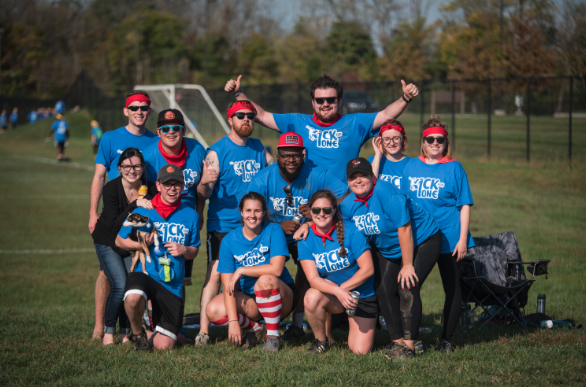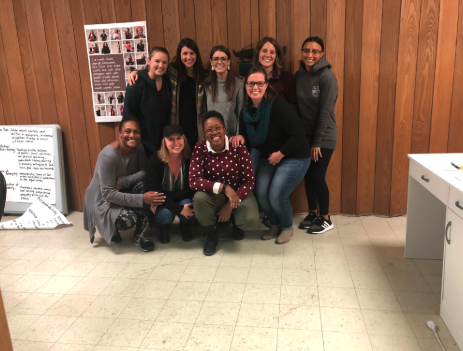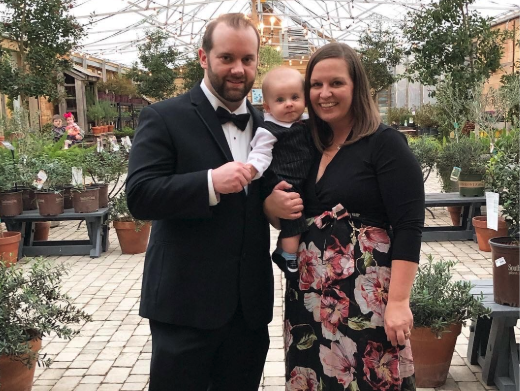Hendricks County Mom Spearheads Fight to End Human Trafficking
Photography Provided
 If you would have told Hendricks County Resident Jessica Evans 10 years ago that by 2020, she would be the founder of one of the state’s leading anti-trafficking organizations, she would have laughed.
If you would have told Hendricks County Resident Jessica Evans 10 years ago that by 2020, she would be the founder of one of the state’s leading anti-trafficking organizations, she would have laughed.
“I would have never dared to lead anything,” Evans says. “I simply picked up a book to learn about something I was interested in. And now here we are.”
Evans lives with her husband, Trevor, and their 18-month-old Joshua on the east side of Brownsburg, and she is the founder of Purchased, a local non-profit committed to helping communities fight human trafficking, the illegal trade in human beings for the purposes of commercial sexual exploitation or forced labor.
While the term human trafficking has become a media buzz word, its presence is very real in the state of Indiana, 142 cases having been reported this year alone (according to the National Human Trafficking Hotline). This number is up from 96 in 2017 and 86 in 2017.
While Evans said the numbers are going up most likely because entities are getting better at reporting these situations, it still barely scratches the surface of this multi-billion-dollar industry.
Purchased’s goal is to raise awareness through education. Staff and volunteers speak at churches, businesses and schools to educate the public on trafficking. Their programs include teaching statewide curriculums to local at-risk youth, training mentors to walk alongside trafficking survivors and providing support to families of survivors.
It wasn’t the statistics that originally drew her in, however. Evans graduated from Indiana Wesleyan University in 2003. She taught kindergarten and first grade in Pike Township for nine years. In 2007, she became interested in the topic of human trafficking. Although it was a sobering topic, Evans had always been drawn to the marginalized.
As she was researching the topic of trafficking, Evans participated in a mission trip to Nepal, a country in South Asia, through a local nonprofit. The trip allowed her to meet and work with women who had been rescued from a life of trafficking and were learning trades, such as making jewelry and soap, in order to support themselves and their families.
Evans vividly remembers one woman in particular. She was young, in her late teens and stunningly beautiful with shiny dark hair and a dazzling smile. She was making jewelry at the ministry Evans and her friends visited and her joy was palpable.
 “We were laughing with her and sharing moments together,” Evans says. “I remember thinking, how can you live through what you lived through and still laugh?’”
“We were laughing with her and sharing moments together,” Evans says. “I remember thinking, how can you live through what you lived through and still laugh?’”
The trip was transformative for Evans.
“It put this thing I had been learning about in the flesh,” Evans says. “These girls, literally like you and me, have been through unimaginable things. When I came home, I had to reconcile what to do with that. It was no longer an issue ‘out there.’”
Once Evans was back in the states, she took her burden to her small group at church and asked for their ideas and prayers. Within a few months, she felt God calling her to organize a concert to raise money to help anti human trafficking efforts. She gathered a few friends for a breakfast meeting, and by the end of the day their benefit concert was slotted for the fall of 2008.
Several hundred concert-goers showed up to hear local artists play, and money was raised for Love 146, a national non-profit that offers survivor care and prevention training. However, when it was over, Evans and her friends didn’t account for the sheer number of people who would approach them after the concert, asking how they could help or get involved.
“They would send us messages saying, ‘Ok, you told us, so what do we do now?’ And we didn’t have an answer for them,” Evans says.
Evans pursued another concert the next year, but this time added a movie and discussion night the week before the concert, showing a two-part documentary about trafficking. Soon, raising money didn’t feel like enough. They began volunteering with Indiana Protection for Abused and Trafficked Humans Task Force (IPATH). Then, Evans and her friends were being asked to speak locally about trafficking in churches and businesses. After attending a Love 146 conference, Evans became overwhelmed and decided to dump all her thoughts into her journal to process everything she was learning.
“Those notes became our mission and vision statement as an organization,” Evans says.
Evans and her team, made up of mostly teachers, decided to press into that vision, naming their group Purchased after scripture in the bible that inspired Evans to dedicate her life to reaching out to at-risk youth and trafficking survivors. The group got their official non-profit status in 2011.
Things never slowed down. From movie and discussion nights to book clubs to guest speakers, running Purchased was nearly turning into a full-time job for Evans, who was still a full-time kindergarten teacher in Pike Township schools. The load was taking its toll. With the encouragement of friends, she quit her job and was hired full-time in 2015.
Over the years, Evans, along with the help of her board, guided Purchased through expanding past education. They began getting trained in My Life My Choice, a curriculum aimed at preventing sexual exploitation in youths by teaching them goals, healthy relationships, perceptions about the commercial sex industry and skills to help reduce their risk of exploitation. This curriculum is for at risk youth, as well as those who have been trafficked and is taught in schools, residential facilities and group homes.
Evans helped teach their first MLMC class in 2014 at Paddock View Residential Facility in Marion, the average age of the class being 16 years old. It was the first time Purchased had been able to work with survivors in Indianapolis. The experience shook Evans. Students shared their stories in journals for the teachers to read in between classes.
“We read the journals and wept over them each week,” Evans recalls. “It was so humbling and so awesome. We just bonded with those girls.”
From then on, Evans did her best to keep her finger on the pulse of what need Purchased could fill. The next need: helping support girls once they’ve taken the MLMC class or have been rescued from trafficking. This led to Purchased writing a mentorship curriculum called Allies.
Allies is designed to train volunteer mentors to walk alongside survivors, offering unconditional friendship and support, something many survivors never had.
“Case managers come to an end,” Evans says. “Therapists come to an end. And services end at age 18. Many of these girls have no one. We wanted to provide someone to walk them through all of that.”
Allies mentors link their mentees to appropriate community resources and help with academic or career skills. Mentors are also simply there to offer a listening ear, have fun and be a positive presence through the ups and downs of life. For these girls, extreme trauma and often family abandonment they endured at very young ages make it difficult to make wise decisions and commit to a successful path. Quarterly, Purchased provides a gathering for all mentors and mentees, offering painting classes, cooking lessons, cookouts and holiday parties. Mentors are trusted friends for their mentees. Purchased also offers a support group called Thrive, designed specifically for parents and caregivers of trafficking survivors.
Purchased still heavily focuses on community education, speaking with businesses, schools, churches, colleges and other groups about the signs of trafficking. They regularly hold fundraising events, such as their annual Kick For One, a community kickball tournament, Illuminate, a silent auction and dinner held every spring and other seasonal campaigns to encourage involvement.
Evans wants people to know that no one is immune to trafficking.
“The first girl we ever had in our mentorship program was from Hamilton County,” Evans says. “A common factor of trafficking is relational poverty, and you can have that wherever you live. It’s just a lack of healthy relationships.”
That relational aspect is what Purchased strives to provide for survivors. Two hundred and fifty girls have taken the MLMC class, and there are 15 mentors in Indianapolis right now matched with mentees who have survived trafficking.
“It’s very difficult to hear these stories,” Evans says. “But there is hope. You can make a difference, whether it’s prevention, giving resources, knowing the red flags or spending time with our mentees. You’re providing healthy relationships that they wouldn’t have otherwise. And that makes all the difference.”






